by James Comey, 2018
 Fascinating personal account of the Director of the FBI, James Comey, and his work under Presidents Bush, Obama, and Trump. Starts out with horrifying account of the Ramsey Rapist breaking into his home when he was a teenager and he and his brother barely living through it, a chapter about being bullied and bullying, another chapter about habitual liars and how easy it is to become a liar, and then insider accounts on his work in New York City under Rudy Giuliani, convicting Mafia leaders, prosecuting Martha Stewart, and then on to Washington, D.C., and working for Presidents Bush, Obama, and Trump. The difficulties of the 2016 election and the FBI being asked to investigate Hillary Clinton and Russian interference are covered in detail.
Fascinating personal account of the Director of the FBI, James Comey, and his work under Presidents Bush, Obama, and Trump. Starts out with horrifying account of the Ramsey Rapist breaking into his home when he was a teenager and he and his brother barely living through it, a chapter about being bullied and bullying, another chapter about habitual liars and how easy it is to become a liar, and then insider accounts on his work in New York City under Rudy Giuliani, convicting Mafia leaders, prosecuting Martha Stewart, and then on to Washington, D.C., and working for Presidents Bush, Obama, and Trump. The difficulties of the 2016 election and the FBI being asked to investigate Hillary Clinton and Russian interference are covered in detail.
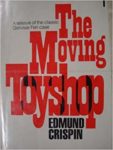 Delightful English mystery set in the town of Oxford in 1938, involving Gervase Fen (pronounced Jer-voz) and his poet friend, Richard Cadogan. Richard is bored and in need of a holiday in order to be inspired to write poetry again. He decides to go to Oxford and arrives late at night and stumbles into an unlocked toy store, only to find the body of an elderly woman, apparently strangled to death. He gets hit on the head and wakes up in a closet with a window open. He crawls out the window, goes to the police, who return to the shop only to find it is now a grocers, not a toy shop. And no body exists and they don’t believe him. Richard goes to his English professor friend, Gervase Fen, and tells him the whole story. Gervase believes him and together they begin a whirl-wind adventure trying to discover who was murdered, why, and by whom. Loved this story! Lots and lots of drinking, of course, and odd characters, and fantastic descriptions of Oxford and surrounding areas. I get confused by all the characters and can’t remember who is who, but no matter – it’s a delightful romp through the English town and countryside, and I love it! There were also so many different words I didn’t know the meaning of so here they all are:
Delightful English mystery set in the town of Oxford in 1938, involving Gervase Fen (pronounced Jer-voz) and his poet friend, Richard Cadogan. Richard is bored and in need of a holiday in order to be inspired to write poetry again. He decides to go to Oxford and arrives late at night and stumbles into an unlocked toy store, only to find the body of an elderly woman, apparently strangled to death. He gets hit on the head and wakes up in a closet with a window open. He crawls out the window, goes to the police, who return to the shop only to find it is now a grocers, not a toy shop. And no body exists and they don’t believe him. Richard goes to his English professor friend, Gervase Fen, and tells him the whole story. Gervase believes him and together they begin a whirl-wind adventure trying to discover who was murdered, why, and by whom. Loved this story! Lots and lots of drinking, of course, and odd characters, and fantastic descriptions of Oxford and surrounding areas. I get confused by all the characters and can’t remember who is who, but no matter – it’s a delightful romp through the English town and countryside, and I love it! There were also so many different words I didn’t know the meaning of so here they all are: 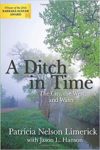 Excellent writer, she covers the history of Denver water from the mid-1800’s to present. The west was a desert, but when gold was discovered and people moved here, they needed water to live and they transformed the desert with lawns, trees, flowers, and bushes, because they wanted what they had in the east. They built reservoirs and dams with hardly any opposition until the 1960s. They took water from the Colorado River, Blue River, Fraser River, Platte River with reservoirs and tunnels and dams and transformed Denver into an oasis. It used to be easy to build a dam or a reservoir in Colorado, with hardly any opposition, except for those on the Western Slope, but agreements could be made and dams and reservoirs built.
Excellent writer, she covers the history of Denver water from the mid-1800’s to present. The west was a desert, but when gold was discovered and people moved here, they needed water to live and they transformed the desert with lawns, trees, flowers, and bushes, because they wanted what they had in the east. They built reservoirs and dams with hardly any opposition until the 1960s. They took water from the Colorado River, Blue River, Fraser River, Platte River with reservoirs and tunnels and dams and transformed Denver into an oasis. It used to be easy to build a dam or a reservoir in Colorado, with hardly any opposition, except for those on the Western Slope, but agreements could be made and dams and reservoirs built.  Beautiful, poignant short illustrated book about Syrian refugee father and son fleeing Syria by boat.
Beautiful, poignant short illustrated book about Syrian refugee father and son fleeing Syria by boat.  This was our first book for the Old Town Library Book Club for 2018-2019. We met and discussed it on 10-15-18. Most everyone liked the book although some did not like the ending. I think it was rather violent but I can’t really recall the ending. I loved the main character, Tayo, who was a half-breed Indian abandoned by his mother and raised by his Christian Aunt on the Navajo Indian reservation. He was always a shame to his Aunt, because of his mother, her sister. He and his cousin, Rocky, enlisted in the Army during WWII and were sent to the Pacific. They ended up on the Bataan death march and Tayo was unable to save Rocky who died a horrible death at the hands of the Japanese on that march.
This was our first book for the Old Town Library Book Club for 2018-2019. We met and discussed it on 10-15-18. Most everyone liked the book although some did not like the ending. I think it was rather violent but I can’t really recall the ending. I loved the main character, Tayo, who was a half-breed Indian abandoned by his mother and raised by his Christian Aunt on the Navajo Indian reservation. He was always a shame to his Aunt, because of his mother, her sister. He and his cousin, Rocky, enlisted in the Army during WWII and were sent to the Pacific. They ended up on the Bataan death march and Tayo was unable to save Rocky who died a horrible death at the hands of the Japanese on that march. 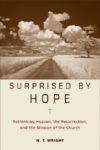 Very deep book about the resurrection of Jesus and the power of it – that God brought heaven and earth together at that moment, and the power continues to radiate through us who believe. The idea that we are not Christians so that when we die, we get to “go to heaven,” but that we are Christians so that we can bring the love of God to those around us and thereby bring the kingdom of God to earth right now. There will be a renewal of the earth at the last day, but everything we do in the name of Jesus, now, has a place in building for the kingdom. Richard Stearns quoted from this book in The Hole In Our Gospel, and what he quoted captures the core message of this book:
Very deep book about the resurrection of Jesus and the power of it – that God brought heaven and earth together at that moment, and the power continues to radiate through us who believe. The idea that we are not Christians so that when we die, we get to “go to heaven,” but that we are Christians so that we can bring the love of God to those around us and thereby bring the kingdom of God to earth right now. There will be a renewal of the earth at the last day, but everything we do in the name of Jesus, now, has a place in building for the kingdom. Richard Stearns quoted from this book in The Hole In Our Gospel, and what he quoted captures the core message of this book:  Tara Westover grew up in a wacko survivalist Mormon home in Idaho. Her dad believed the end times were coming and they buried fuel, guns, ammo, and canned goods all over their mountain junkyard home. He wouldn’t let them go to school, to a doctor or hospital. Tara didn’t even know when she was born; she had no birth certificate. He also almost caused the deaths of several of his children by his dangerous practices while making them work in his scrap yard/junk yard.
Tara Westover grew up in a wacko survivalist Mormon home in Idaho. Her dad believed the end times were coming and they buried fuel, guns, ammo, and canned goods all over their mountain junkyard home. He wouldn’t let them go to school, to a doctor or hospital. Tara didn’t even know when she was born; she had no birth certificate. He also almost caused the deaths of several of his children by his dangerous practices while making them work in his scrap yard/junk yard.
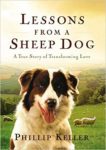 “A True Story of Transforming Love”
“A True Story of Transforming Love” Interesting account of the hurricane that struck and almost completely destroyed Galveston, Texas, on September 8, 1900. Told on the basis that the Weather Bureau made grave errors due to pride and ignorance, so Galveston had no warning of its impending doom. Isaac Cline was the Galveston Weather Station’s chief. Over 6000 people died, including Isaac’s wife.
Interesting account of the hurricane that struck and almost completely destroyed Galveston, Texas, on September 8, 1900. Told on the basis that the Weather Bureau made grave errors due to pride and ignorance, so Galveston had no warning of its impending doom. Isaac Cline was the Galveston Weather Station’s chief. Over 6000 people died, including Isaac’s wife.
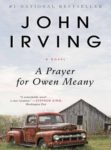 Unique, thought-provoking, sometimes hilarious story about tiny Owen Meany and his best friend, Johnny Wheelwright, and their growing up in Gravesend, New Hampshire, in the 1950’s and 1960’s. The story is told from Johnny’s perspective and starts with telling how, during Sunday school when their teacher left the room for a smoke, they loved to lift up Owen and pass him around in the air. At first you think they are going to be mean and bully him, but they LOVED the little guy; they just couldn’t resist lifting him up and passing him around. And, Owen didn’t play the victim – not that he enjoyed being lifted up and passed around, but he didn’t cry or whine or tell on them, even when the teacher returned and snapped, “Owen Meany, you get back to your seat! You get down from there!” (As if “Owen Meany had put himself up in the air”!)
Unique, thought-provoking, sometimes hilarious story about tiny Owen Meany and his best friend, Johnny Wheelwright, and their growing up in Gravesend, New Hampshire, in the 1950’s and 1960’s. The story is told from Johnny’s perspective and starts with telling how, during Sunday school when their teacher left the room for a smoke, they loved to lift up Owen and pass him around in the air. At first you think they are going to be mean and bully him, but they LOVED the little guy; they just couldn’t resist lifting him up and passing him around. And, Owen didn’t play the victim – not that he enjoyed being lifted up and passed around, but he didn’t cry or whine or tell on them, even when the teacher returned and snapped, “Owen Meany, you get back to your seat! You get down from there!” (As if “Owen Meany had put himself up in the air”!)
 Took me too long to finish, but it was interesting. Ranger Anna Pigeon is on temporary assignment on Dry Tortugas National Park, where Fort Jefferson was built during the Civil War to house war prisoners. She intersperses Anna’s mystery – finding out why she’s seeing ghosts and why her assistant was almost killed when a “go-fast” boat he was approaching exploded – with old letters from her great-great Aunt Raffia, who lived at Fort Jefferson at the end of the Civil War at the same time it was housing famous prisoners accused of aiding in the assassination of President Lincoln.
Took me too long to finish, but it was interesting. Ranger Anna Pigeon is on temporary assignment on Dry Tortugas National Park, where Fort Jefferson was built during the Civil War to house war prisoners. She intersperses Anna’s mystery – finding out why she’s seeing ghosts and why her assistant was almost killed when a “go-fast” boat he was approaching exploded – with old letters from her great-great Aunt Raffia, who lived at Fort Jefferson at the end of the Civil War at the same time it was housing famous prisoners accused of aiding in the assassination of President Lincoln.
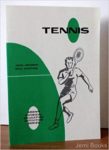 Short book (88 pages) describing everything you need to know about tennis. Under “Values:”
Short book (88 pages) describing everything you need to know about tennis. Under “Values:”
 Short book (32 pages) for children packed with tips on writing. I particularly liked the tips on how to get more details into your writing:
Short book (32 pages) for children packed with tips on writing. I particularly liked the tips on how to get more details into your writing:
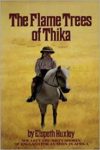 Beautifully written autobiography about Elspeth’s childhood years in Kenya in the early 1900’s before World War I. Her Mom and Dad, whom she calls Tilly and Robin, are determined to make it as coffee farmers in Kenya, despite no one having done so before and them not having the skills or the knowledge. But, they did have the determination and the heart, and they would have made it had the War not forced them to leave their beloved farm. Beautiful descriptions of the animals, the people (Kukuyu and Masai) and the land. Robin bought the farm sight unseen and when they finally got there after train, wagon, mule, walking, it was a desert.
Beautifully written autobiography about Elspeth’s childhood years in Kenya in the early 1900’s before World War I. Her Mom and Dad, whom she calls Tilly and Robin, are determined to make it as coffee farmers in Kenya, despite no one having done so before and them not having the skills or the knowledge. But, they did have the determination and the heart, and they would have made it had the War not forced them to leave their beloved farm. Beautiful descriptions of the animals, the people (Kukuyu and Masai) and the land. Robin bought the farm sight unseen and when they finally got there after train, wagon, mule, walking, it was a desert.
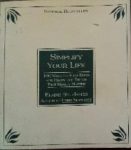 Easy to read, fun little how-to book on simplifying your life. Some parts are outdated (“Drop call waiting,” “Stop the Junk Mail,” and “Get rid of your car phone”) and there is no mention of social media, e-mail, internet, etc., because they weren’t around yet in 1994. But our lives have only become more complicated because of technology, and much of the advice can still be applied in 2018. The chapters are only one to two pages long and cover how to simplify “Your Household,” “Your Lifestyle,” “Your Finances,” “Your Job,” “Your Health,” “Your Personal Life,” “Special Issues for Women,” and “Hard-Core Simplicity.” If you only had time to read the chapter titles in each section, you’d come away with ideas to simplify your life. Here are some examples:
Easy to read, fun little how-to book on simplifying your life. Some parts are outdated (“Drop call waiting,” “Stop the Junk Mail,” and “Get rid of your car phone”) and there is no mention of social media, e-mail, internet, etc., because they weren’t around yet in 1994. But our lives have only become more complicated because of technology, and much of the advice can still be applied in 2018. The chapters are only one to two pages long and cover how to simplify “Your Household,” “Your Lifestyle,” “Your Finances,” “Your Job,” “Your Health,” “Your Personal Life,” “Special Issues for Women,” and “Hard-Core Simplicity.” If you only had time to read the chapter titles in each section, you’d come away with ideas to simplify your life. Here are some examples:
 I love Inspector Morse mysteries. I miss them when I’ve finished because Inspector Morse and Sergeant Lewis are so likable, so human, and I just want to be with them. They take me to England and back to a time before much technology, except for color TVs. Morse consults maps, phone books, a rolodex (a new invention in this book), and when he wants to know what time it is, he turns on the radio:
I love Inspector Morse mysteries. I miss them when I’ve finished because Inspector Morse and Sergeant Lewis are so likable, so human, and I just want to be with them. They take me to England and back to a time before much technology, except for color TVs. Morse consults maps, phone books, a rolodex (a new invention in this book), and when he wants to know what time it is, he turns on the radio:
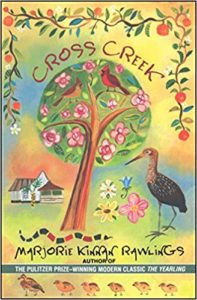
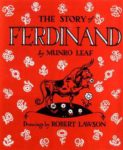 Drawings by Robert Lawson
Drawings by Robert Lawson
 Jean Perdu owns a book barge in Paris. He is 20 years into grieving his lost love. She gave him a letter but he never opened it. Finally he does and she left him because she was dying of cancer. He unhooks his barge and travels south with Max Jordan, a young author with writer’s block, and 2 cats. They meet Salvatore Cuneo, also looking for a lost love, and who eventually meets the love of his life – an author – and Jean gives them the boat and travels on by car to Sanary de Ser or something like that where he swims, gets tanned and in shape and discovers he loves Catherine and they live happily ever after. Book Club book – no one liked it except Mom and 2 others. Mom fell in love with lavender after reading this book and makes lavender snickerdoodle cookies, drinks lavender tea, and wants to see fields of lavender in bloom.
Jean Perdu owns a book barge in Paris. He is 20 years into grieving his lost love. She gave him a letter but he never opened it. Finally he does and she left him because she was dying of cancer. He unhooks his barge and travels south with Max Jordan, a young author with writer’s block, and 2 cats. They meet Salvatore Cuneo, also looking for a lost love, and who eventually meets the love of his life – an author – and Jean gives them the boat and travels on by car to Sanary de Ser or something like that where he swims, gets tanned and in shape and discovers he loves Catherine and they live happily ever after. Book Club book – no one liked it except Mom and 2 others. Mom fell in love with lavender after reading this book and makes lavender snickerdoodle cookies, drinks lavender tea, and wants to see fields of lavender in bloom.